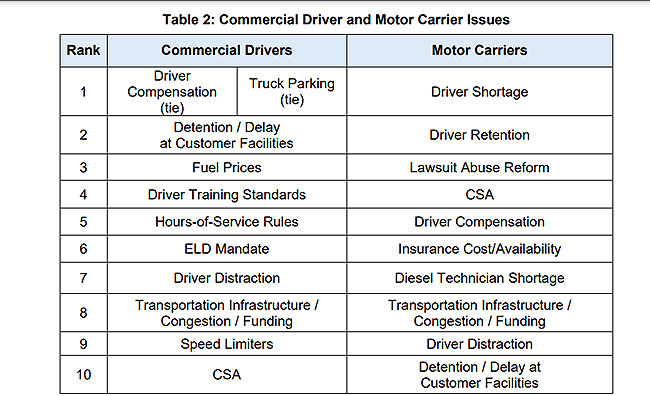Staff Reporter
Three Guidebooks Being Developed to Help States Improve Truck Parking

[Stay on top of transportation news: Get TTNews in your inbox.]
The American Transportation Research Institute supports efforts to create three guidebooks to help states better manage and improve truck parking facilities.
The guidebooks will be developed in research projects conducted by the Transportation Research Board, an arm of the nonprofit National Academies of Sciences, Engineering and Medicine. TRB provides leadership in transportation improvements and innovation through impartial research and advice.
Truck parking tied with driver compensation as the No. 1 issue for commercial drivers in ATRI’s annual Top Industry Issue Survey in 2021. ATRI has participated in more than 35 truck parking projects.

(American Transportation Research Institute)
Alexandra Shirk, ATRI research associate, said the guidebooks could help create guidelines for all states, metropolitan planning organizations and local governments to educate them about the challenges of truck parking.
“One frustrating anecdote we consistently hear is how local governments don’t know that truck parking is a problem, nor do local governments consider large trucks when making decisions. So hopefully these guidebooks will help with educating decision-makers,” Shirk said.
READ MORE: Acting FMCSA Chief Robin Hutcheson Says Truck Parking a Top Issue
Improving the parking situation should include educating local officials and standardizing technology and space availability reporting, she noted. “Just creating spaces isn’t enough. The spaces must be safe and useful to drivers.”
The Guidebook for Truck Parking Information Management Systems (TPIMS) is meant to suggest best practices that cover planning, design, operations, procurement and selection of technologies as well as handling reporting information, life cycle considerations and interagency coordination. The $500,000 project would span 22 months.

Amir Hanna, TRB senior program officer in charge of that project, is managing that guide, which he believes will be of interest to state departments of transportation, trucking organizations, commercial motor carriers and drivers. Hanna predicted work will not begin for three months due to a lengthy process of reviewing proposals, selecting a contractor/company and writing up a contract.
ATRI worked with the Mid-America Association for State Transportation Officials to help implement and understand driver reactions to the region’s TPIMS. Shirk said driver surveys indicated the new system was helpful, but not always accurate.
She thinks a TRB guidebook on TPIMS would lead to standardization across the country so interstate drivers can be sure parking information is delivered in the same way throughout the United States.
TRB is also reviewing proposals for a $450,000, 30-month contract to create a Guidebook for Local Truck Parking Regulations. The project will examine how and why local government officials make decisions on truck staging and/or short- and long-term parking policies. It will also identify opportunities in truck parking regulations and offer a range of ordinances and regulations for local officials to adopt. Factors to include are public and private truck parking, on- and off-street parking, cargo origins/destinations, truck classification, emerging technologies (electric vehicles and automated vehicles) and seasons, days of the week and times.
Current truck parking challenges include zoning laws that vary across the country — either eliminating trucking parking developments entirely or slowing the process to “a crawl,” Shirk said.
“With warehouse space increasing all over this country due to e-commerce and consumer expectations, truck parking needs to be part of that discussion,” she added, noting that local leaders should know that when they create industrial areas with warehouses they also will create a need for truck parking or staging areas.
Want more news? Listen to today's daily briefing above or go here for more info
The project for the third guidebook, Truck Rest and Service Areas for Critical Supply Chain Delivery, has a June 3 deadline for proposals. TRB will spend $180,000 over two years to produce a guide that results in identifying essential needs of truck drivers for facilities to ensure the health, safety and security of freight movements in normal operations and emergencies.
“During a critical emergency time in which goods must keep moving, whether it’s toilet paper or medical supplies, states need to be prepared to keep rest areas open and reasonably clean so goods can continue to move,” Shirk said.
Researchers are to look at how truck parking facilities integrate within critical infrastructure and contribute to a resilient freight transportation system.
“During the pandemic it was readily apparent that truck drivers were essential workers, the facilities that drivers rely on to do their work should also be considered essential, and nationwide guidance on how best to operate such facilities during trying times is crucial,” Shirk added.




